Institutional Context
Summary
For every £1 invested in Research & Knowledge Exchange, the University delivers £6.50 in regional GVA. We are a top 10 University for social inclusion, with ~18,000 students from over 120 countries; we create transformational opportunities where our graduates benefit from a 91% employment rate. Our graduate start-up programme consistently makes us a UK top-ten University for creating companies that survive and grow beyond three-years, building on our research expertise in health, data and management.
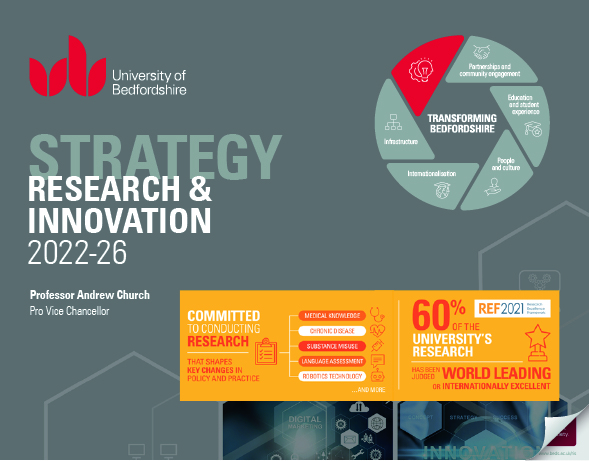
Figure 1 Research & Innovation Strategy 2022-26
We help grow the economy: always led by external demand for collaborative research, upskilling, consultancy, CPD, apprenticeships and public engagement, External validation shows we create £70m in national GVA through Knowledge Exchange alongside our £370m regional economic footprint.
Institutional context
The University operates four campuses in Luton, Bedford, Milton Keynes and Stoke Mandeville, and our own conference and events centre at Putteridge Bury; we occupy the strategically important centre of the Oxford to Cambridge Pan-Regional Partnership. With Luton’s diversity quotient over 50% and Bedford’s ethnic minority community over 25%, we reflect the demographics of our region in our staff and student populations.
Our Transforming Bedfordshire Strategy structures our activities to meet our key strategic impact objective - cementing our place as an anchor institution serving our communities and region in line with the Levelling Up agenda. Our footprint of impact reaches across the South East Midlands Local Economic Partnership (SEMLEP) area, comprising 1.7m population, 89,000 businesses (of which >88,000 are SMEs and 80,600 have fewer than 50 employees). This means our KE focus is often led by SMEs; regional demand is currently in data visualisation, logistics, creative and cultural, and manufacturing, but Bedfordshire is also a national leader in successful entrepreneurial growth. We have a strategic goal in our Research & Innovation Strategy to ensure KE supports our students to build on our track record and we are still 4th in the country for graduate start-ups.
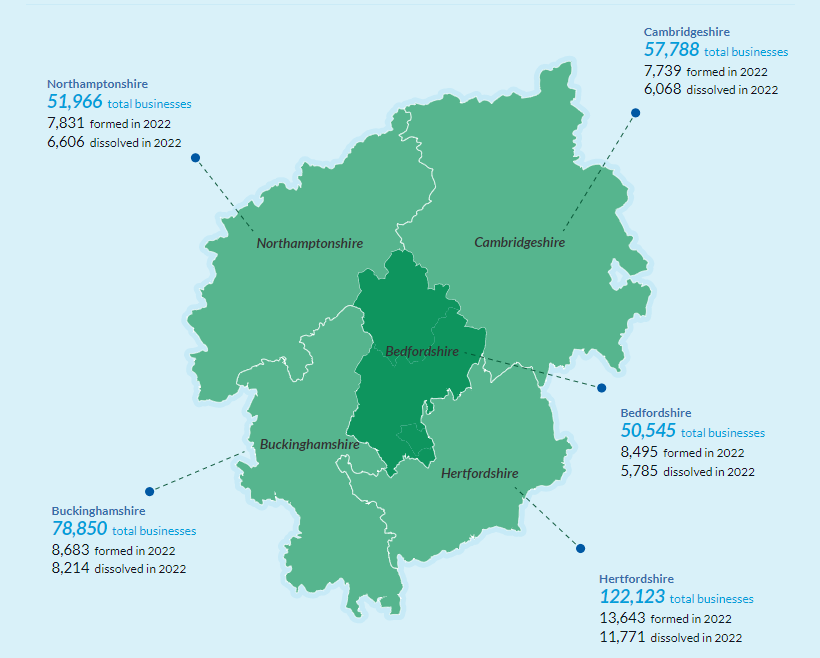
Figure 2 https://www.informdirect.co.uk/infographics/id/?location=bedfordshire&year=2022
Our senior staff sit on the board of SEMLEP, Luton Business Improvement District, Luton Employability and Skills Partnership, the Arc Universities group, Luton Town Centre Strategic Board and Bedford Town Centre steering group.
Our strength is SMEs. Each year, our robust CRM shows we’ve delivered £70m in gross value added to over 1,800 private sector SMEs in the region; we hold the Small Business Charter award; and are commended by our customers. We structure our ladder of business engagement from one-day workshops to three-year collaborative R&D projects to overcome customer resource constraints.
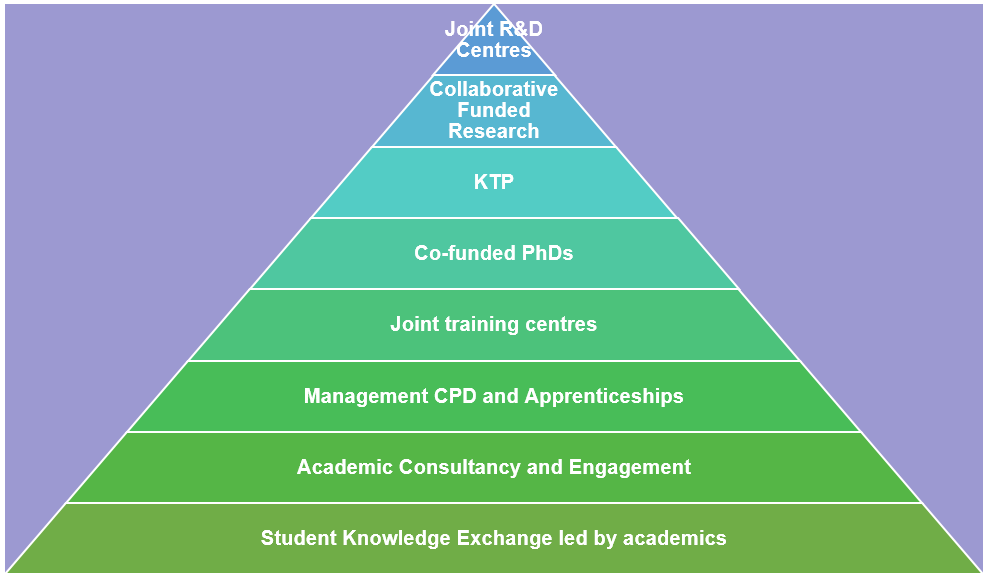
Figure 3 University of Bedfordshire's ladder of business engagement
We are a top five University for CPD in the UK (HEBCIS 2022). Contrary to the 21.3% national decline in HE-delivered CPD in 2020/21, the University of Bedfordshire’s business-facing CPD grew and expanded. Our industry and service sector Lean Six Sigma training has been delivered to circa 130 organisations including Leonardo, Securitas, the Body Shop, Ocado and Expedia, and our apprenticeship provision was rated Good across all measures by Ofsted in 2023.
Beyond the private sector, we are approved Crown Commercial suppliers working with over 500 public sector organisations, NHS Trusts, Councils and even training other universities, particularly in health, social, and educational-related policy and productivity. We train nurses, teachers and social workers, creating new skills provision where national demand is clear, and we lead our regional partners in tackling health inequalities through the £3m BLMK integrated care system Research and Innovation Hub.
Our Research & Innovation Strategy is locally enabled through our innovative Civic Agreement for Luton, with its vision to create a healthy, fair and sustainable town where no-one has to live in poverty. The Civic Agreement focuses our delivery of business growth support, academic expertise, skills, entrepreneurship and R&D to deliver transformational employability, socio-economic growth and productivity.
For further information, please send queries to ris@beds.ac.uk
Local Growth and Regeneration
Summary of approach
A “top 5” entrepreneurial University, we evolved from an engineering polytechnic to working locally, regionally and nationally with over 1,500 manufacturing, service, public and third sector organisations every year. Our £370m anchor footprint helps shape the local economy, driving economic, community and social improvement at policy and operational levels, always in response to external need.
Our support attracts and catalyses inward investment to the region, regenerating legacy engineering and millinery industries whilst also creating new opportunities in AI, Bioscience and clean technology.
We work with Local Authorities, SEMLEP and the Oxford-Cambridge Pan-regional Partnership to create change. Our place-based approach has impact – every £1 spent with our University has created £6.50 in regional Gross Value Added since 2014.
Aspect 1: Strategy
Our University Strategy, Transforming Bedfordshire, sets out goals that embrace our civic and economic role, maximising opportunities for our students through strategic alignment with local and regional growth priorities, bolstering student career aspirations, enhancing employability, sparking entrepreneurial spirit and engaging students in business to add value to our local and regional economy.
Local:
As a civic university, we work with key public authorities and services, business and industry, community and voluntary sector organisations, contributing to their strategy development. Our new 2023 Civic Agreement with Luton Borough Council has a strategic priority for building an inclusive economy, growing business, jobs and income based on sharing economic and skills intelligence.
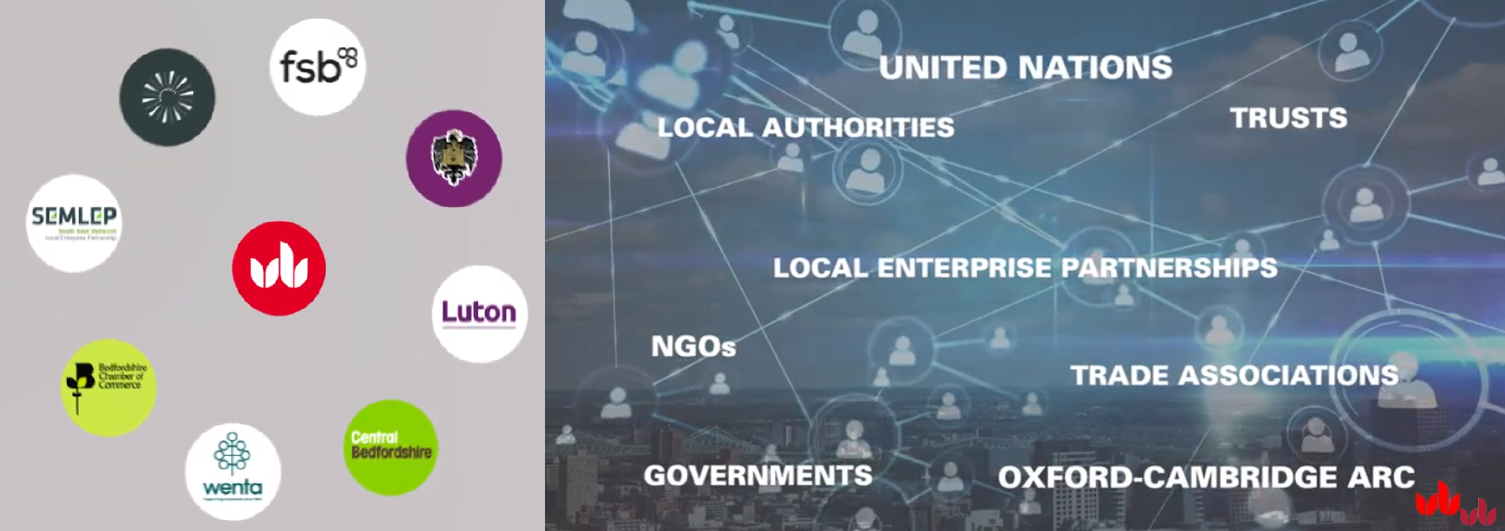
Figure 1 Examples of the key organisations we work with on strategic delivery
We commission annual market research to ensure we are demand-led, revealing that the network of universities in our region is part of an underutilised R&D ecosystem; hence our programmes are designed to leverage our academic expertise for solving problems.
In Luton, building on our track record as 4th in the UK for successful graduate start-ups, we lead on digital skills and entrepreneurship for the Luton Employment and Skills Partnership Board. We are developing the University Quarter as part of Luton’s town centre regeneration masterplan and have consulted widely to assist the development of the town’s new city centre football stadium. Central to this is regeneration of the Hat District into a Cultural and Creative incubation zone. Luton Airport is the town’s major employer. We have consulted on Green Horizons, part of Luton Airport’s regeneration plan, and are planning a joint data visualisation training centre and incubator.
From our Bedford campus, we are part of the Town Deal board, working to regenerate High Street businesses, and we have consulted extensively on East-West Rail, the A428 extension and developed joint plans for Bedford Green Energy Innovation Park as part of the Bedford Economic Prosperity Plan.
Our Aylesbury Campus runs in partnership with Buckinghamshire Healthcare NHS Trust (BHT) at Stoke Mandeville Hospital, home to the world renowned National Spinal Injuries Centre.
The Arts and Culture Projects team direct engagement and growth through local boards including Luton’s Cultural Strategy Group and Luton’s Heritage Strategy Group, RevoLuton’s Creative People and Places Consortium, Central Bedfordshire’s Culture Hub Board, Bedford’s Cultural Partnership, SEMLEP’s Creative Industries SIG Group and Arts Council England’s SE Cultural Innovation Forum.
Regional:
Our regional approach is developed with insights from external partners such as the National Centre for Universities and Business and from direct qualitative and quantitative research, leading to our sustained focus on the ~88,500 SMEs in SEMLEP. Centred within the London/ Oxford/ Cambridge triangle, we have attracted over £20m in regional business regeneration funding in the past 5 years, building on our 3 pillars of interdisciplinary research strength; (1) Health, Wellbeing and Social Justice (2) Technology, Business and Productivity (3) Communication, Learning and Creativity.
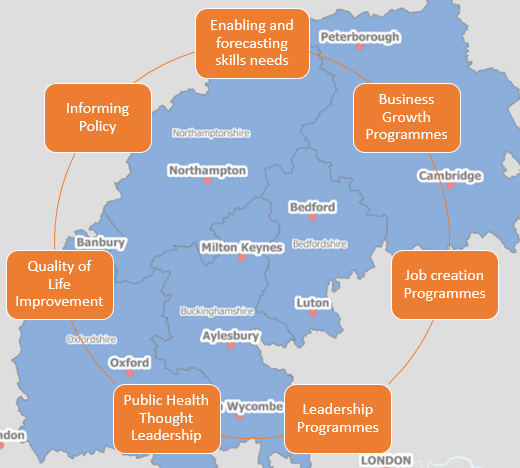
Figure 2 Our geographic footprint of growth impact
Our Vice Chancellor is Chair of the SEM:Universities group and sits on the SEMLEP governing board and Skills Board, we are informed by SEMLEP’s industrial strategy, skills reports and from joining consultations on major infrastructure projects such as East-West Rail and the Linmere Housing Development. We are referenced in documents such as the Local Industrial Strategy with case studies of our work on growing businesses, and capabilities in data management, AI and Robotics.
Since KEF2, we have created a new Research and Innovation Strategy where one of the 5 goals is IMPACT – collaboration that co-creates impact meeting the needs of industry, policy makers and communities by maximising our external engagement through funded programmes, leveraging private sector investment and generating the mutually beneficial reciprocal exchange of ideas with our civic partners.
Cross-cutting themes: We see EDI as another way to provide more opportunities to people – part of our core widening participation mission. Our regeneration works create multiple community and business touch-points where we can bring the influence of our Disability Network, Race Equality Network, Women’s Network and LGBTQ+ network to bear. We also build in environmental sustainability to every regeneration project as part of our commitment to retaining our 2nd place nationally in the People and Planet Green League and our membership of the UK Universities Climate Network.
Aspect 2: Activity
Local:
We standardised our offer to businesses based on what they want – a menu of options laying out an easy way in to working with us, as suggested in the KE Concordat:
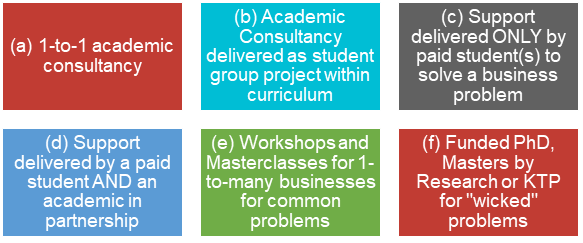
Figure 3 The basic menu of offers that form an easy way to start working with us
We joined the board of Luton Business Improvement District and developed our Productivity Programmes for SMEs in conjunction with Luton and Central Bedfordshire Councils.
Research, Strategy and Advocacy
The Arts and Culture Projects team are working closely with Luton Borough Council and key businesses/third sector in the development and delivery of the Luton Cultural Strategy: Harnessing Momentum and the Luton Heritage Strategy: Curating Luton. The team are also working with the same partners via opportunities relating to being an Arts Council England and National Lottery Heritage Fund Priority Place/Area of Focus.
The Arts and Culture Projects team are also prioritising a collaboration with Bedford Council in their development of a cultural strategy for Bedford Borough. In 2021, the Arts and Culture Projects team supported the development of the vital KE link between Central Bedfordshire Council and our researcher Dr Tamara Ashley, who has gone on to undertake key funded work via the Council in terms of scoping the needs of the local creative industries.
To help regenerate Luton’s Hat District, we developed Local Cultural Education Partnerships who ran major nationally funded projects including Heritage Impact Accelerator, Heritage Enterprise Hub, Artist Accelerator, Catalyst Co-Lab, Arts Elevator and created the Artist's Enterprise Zone. We mirrored this in Bedford, providing a bridge into entrepreneurial activities for creative and cultural practitioners.
We ran a programme of social entrepreneurship support for Ukraine – delivered largely online by academics and professors in our Business School, and we were able to do this with no extra funding. Where we also worked without funding was with HSBC on action 55 of the Cabinet Office’s Inclusive Britain action plan around Student Entrepreneurs.
We are leading on the entrepreneurship agenda in Luton, having developed a completely new model of staged entrepreneurship support starting with our Pathways to Self-Employment and BeMore Entrepreneurial programmes. We provide easy routes into these programmes so that any company, of any size, with any problem, has a way to access the help they need.
We won funding to lead on the £3m Bedford, Luton and Milton Keynes (BLMK) Integrated Care Research and Innovation Hub, which aims to practically support stakeholders with making positive step changes in health and social care.
In Bedford, we run regular Business Regeneration events across the town, and we mirrored programmes such as IMAGE and ICT Escalator, leading to KTP and joint publications with local companies. We host an annual regional conference for Teaching Assistants as a result of a recognised need within our local and regional Academy Trusts; the last conference attracted 439 TAs across 84 primary and 37 secondary schools.
Through its partnership with schools in Bedford Borough, Teacher Education staff at the University of Bedfordshire regularly meet with the Bedford Borough Learning Exchange (an organisation for education leaders in Bedford) on knowledge exchange activities.
The Institute of Research and Continuing Professional Development IRCPD formed in 2020 as a partnership between The Institute of Research in Education (IRED) and the Associate Fellowship Group (AFG), a group of Bedford-based teachers and educationalists. Its core purpose is to foster dialogue, mutual understanding and collaborative planning between researchers, academics and educational practitioners, access to a programme of research and continuing professional development based at the UoB Bedford Campus as a basis for evidence-informed dialogue and educational development. The IRCPD provides access to a network of school staff who are interested in similar areas of research, as well access to lectures, seminars and workshops at the University.
Also in education, the ‘School-led Research Hub’ established in 2022 provides an opportunity for Bedford Borough school staff to discuss research ideas with IREd research staff who support schools/teachers in taking an initial idea, trialling it and writing it up as a research proposal.
Regional:
SEMLEP data revealed lower productivity across our towns, often as a result of uninformed management. We delivered programmes of leadership and strategy, and significantly promoted our internationally excellent Lean Six Sigma programme.
To provide organisations with access to the ecosystem of innovators and inventors, we are running our third iteration of European Regional Development Fund (ERDF)-funded Innovation Bridges, directly connecting businesses who want to innovate with our staff of scientists, technologists, designers, professors and business school leaders. Projects ranged from the development of a TV studio for CPD to a beanbag made from office waste.
To access digital change, we deliver support through ERDF-funded Productivity Escalator, designed to help businesses make better use of broadband and data. These run alongside our other regeneration projects in collaboration with SEMLEP delivering Business Growth.
To address access to skilled staff talent, we delivered the Time2Grow programme SEMLEP wide, which gave SMEs a skilled graduate for three months to work on a known business problem. Despite the impacts of repeated lockdowns, 60% of participants on Time2Grow secured permanent, graduate-level employment, and created 65 further jobs.
Cross Cutting themes:
Alongside events such as climate change summits, we have helped our regional SMEs develop 341 Sustainability policies and 328 Equality policies.
We have implemented employer advisory boards in all our 12 schools which link to KE projects, where members have benefitted from knowledge exchange projects, and we have extended a previous KE project aimed only at graduates so that it can now be delivered with current students guided by academics.
Governance:
We lead and govern regeneration knowledge exchange across the University through a robust Knowledge Exchange and Impact Committee (the “KEF Committee”) that reports to our Research and Innovation delivery Board and monitors our impact, ensures results and enables continuous improvement in line with the KE Concordat.
What matters in KEF is the impact of the HEI for knowledge exchange, so we capture market intelligence and impact automatically linking it in our Customer Relationship Management system to company, region and research institute. Two particularly innovative features are (1) that this links to individual University of Bedfordshire academic records to show the effect of KE on career trajectory, and (2) that it is live-linked to Companies House records allowing us to monitor company survival.
We reward success with University level KE and Impact celebration awards, promotion pathways for knowledge exchange linked to regeneration, and a clear route for KE activity reporting which goes from delivery to University Board of Governors in 4 steps.
Aspect 3: Results
The best evidence of results come in the form of unsolicited positive feedback such as this video from MHF Creative. We have attracted over 20% of total business regeneration funding in the region despite only having 8% of the academic base.
Our core regeneration projects model has been so successful that it led to publications for the academics and Small Business Charter accreditation of the University’s Business School. Case studies regularly emerge, such as Dr Tayong’s work with a local manufacturer where a short regeneration project, developed into a research proposal which obtained funding, and is now progressing to a full KTP. An example that meets our strategic aim of improving employability - with academics using live KE problems as teaching and learning tools for students, so that students gained experience of delivering knowledge exchange in real time.
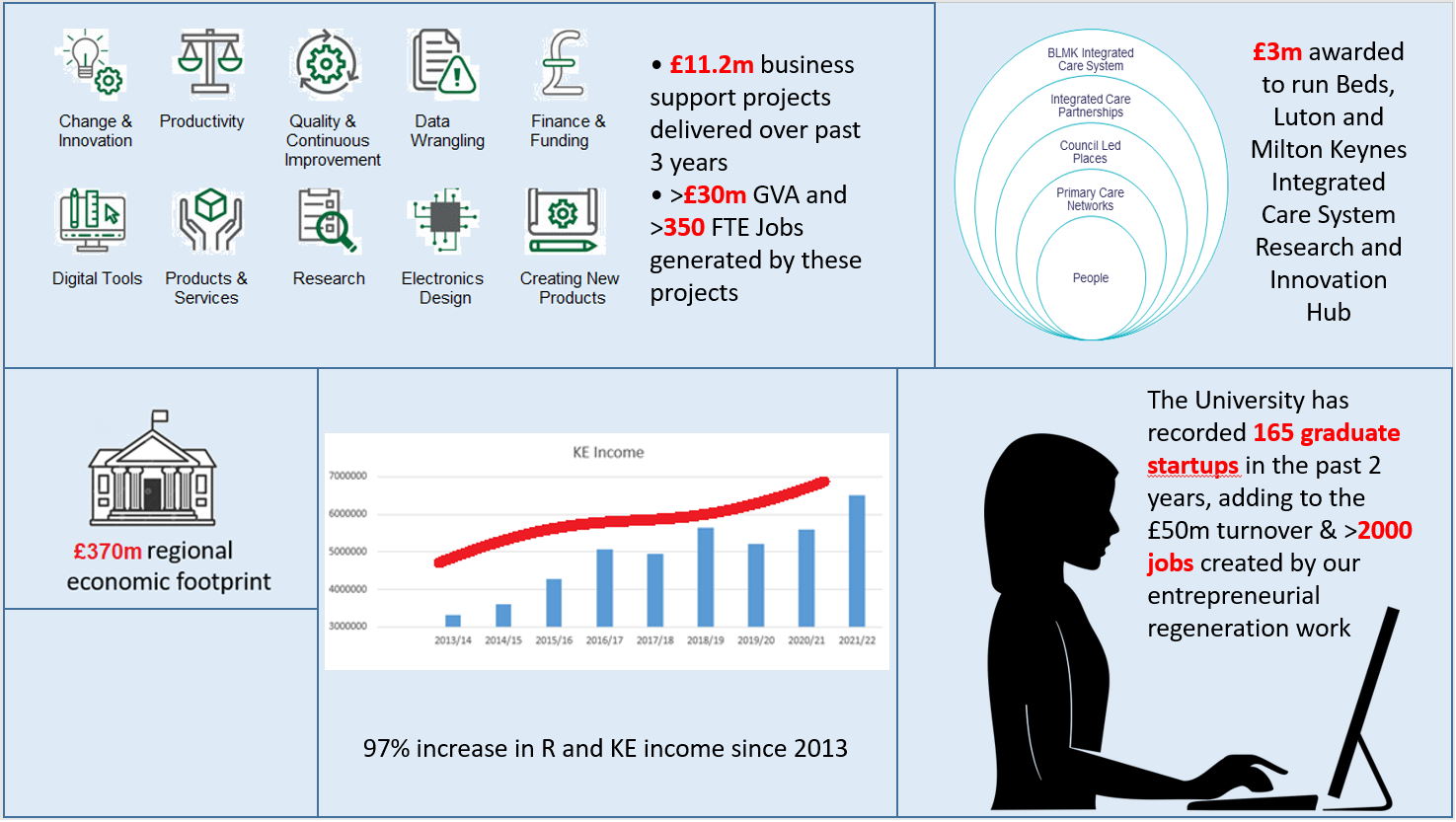
Figure 4 Infographic of impact summaries from Hatch Regeneris Report and HESA data
For sustained success in entrepreneurship, we judge ourselves by the number of graduate start-ups we have influenced who have survived more than 3 years. Our University has been in the top 10 for this nationally since 2013, and we are now increasingly approached for advice and guidance on this by other HEIs.
CPD – we are leaders in the offer of CPD to business, notably our industry and service sector Lean Six Sigma training which has been delivered to circa 130 organisations including Leonardo, Securitas, the Body Shop, Ocado and Expedia. In addition, the training has attracted a number of NHS Trusts, Councils and even other universities such as Hertfordshire and the University of Warwick.
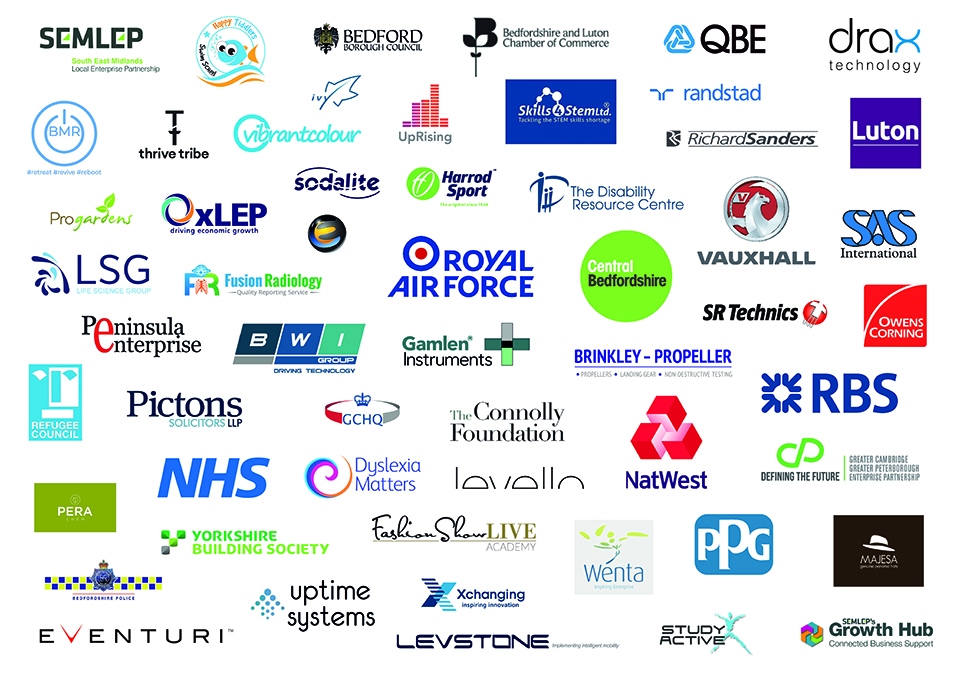
Figure 5 Examples of organisations we have worked with in the relevant period
Our Time2Grow project had the highest graduate placement to permanent recruitment figures of any project in the region, proving that short-term funded engagement between universities, businesses and graduates has a significant impact on regional economic growth and retaining talent close to home rather than losing it to major cities.
Activity leads to sustained and measurable impact – and we believe we can help any company to do more and succeed more. Why not tell us what help you need?
Public & Community Engagement
Summary of approach
Under our previous Community Charter, our impact was powerful but not measured. 2021-23 began the replacement of our Charter with the collaborative production of a nationally distinct Civic Agreement with Luton Borough Council focused on fairness and empowerment. Central to our agreement is a shared celebration of cultural diversity and of the power of research, education and enterprise to shift long-standing societal problems. The Charter replacement process will finish in late 2023 with the launch of our new national and international Public & Community Engagement (P&CE) Strategy followed by an operational plan in 2024.
Our approach remains collaborative and driven by external need, delivering change that stems from our academic research and primarily benefits our local and regional communities.
Aspect 1: Strategy
Our previous Public & Community engagement (P&CE) centred around our Community Charter, with its 13 commitments that shaped our operational faculty/professional service plans, and our significant socio-economic impact.
In December 2018, Luton Council established the Luton Inclusive Growth Commission chaired by our former Vice Chancellor, to investigate how best to ensure everyone in Luton can contribute to and benefit from growth in the town. The Commission delivered its final report to the council in July 2019, which included 12 high level ambitions for developing a productive town, collaborative communities and happy, healthy and successful people.
Then the pandemic hit, and all our work pivoted into the many ways we contributed to the UK’s resilience toward Covid-19.
During the pandemic, the Council created its Luton2040 vision with the University as a strategic anchor- institution partner. The shared vision is to make Luton a healthy, fair and sustainable town where everyone can thrive and no-one has to live in poverty.
Consultation on the renewal of our University Strategy in 2021 allowed us to reflect on responses to the pandemic in our communities. Our anchor-institution pledge to the town to engage fully in all aspects of inclusive growth and engagement fed into the design and launch of our new Strategy “Transforming Bedfordshire” which created 2 interlinked P&CE goals;
Communities: As an anchor institution, we will embrace our civic and economic role, taking pride in our positive engagement in the communities and sectors we support.
Impact: Our research and innovation will enhance our reputation and make a positive impact on our teaching and our economic and civic role.
To drive this change, in 2021 the University appointed Professor Andrew Church as PVC for Research & Innovation. Andrew operationalised and developed our community engagement portfolio in line with the Kerslake Report on Civic Universities and engaged the Institute of Community Studies to advise on a P&CE strategy.
This facilitated co-production of a Civic Agreement with Luton Borough Council (site of our main campus) throughout 2022.
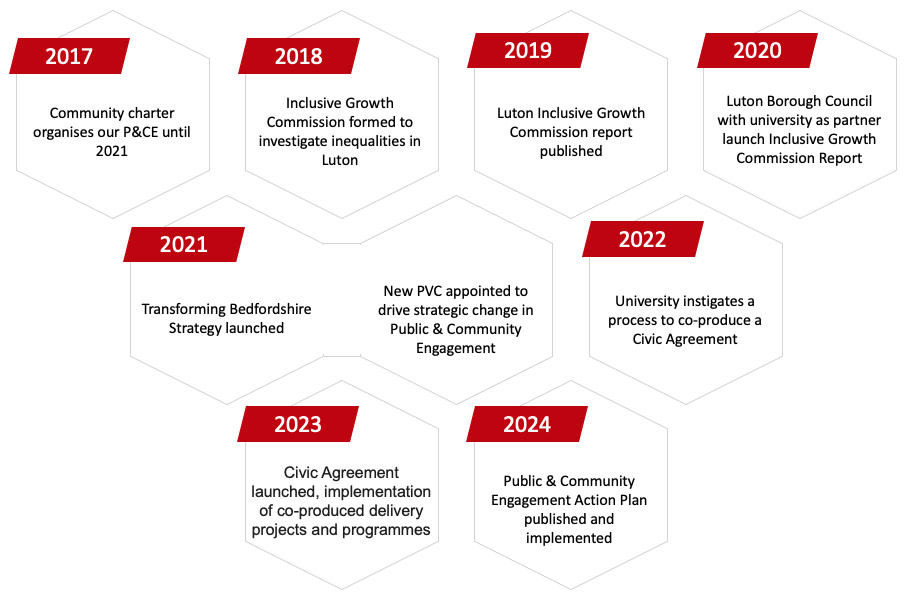
Figure Timeline of development refreshing our P&CE strategy
Councillors and University governors formally signed-off the Civic Agreement in January and a joint launch event was held in March 2023. The Civic Agreement brings strategic alignment to the roles of the University and the Council in support of local goals for the transformation of Luton. It identifies thematic areas of focus – place, public life and partnerships – along with measurable goals and working practices to ensure greater coordination and close working. The Civic Agreement mission “Collaboration and innovation for a fair and thriving future for Luton” builds on the Luton2040 vision, with the following 5 priorities the focus of our shared efforts.
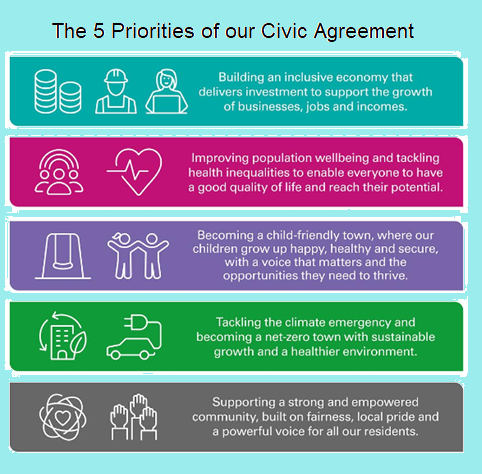
Figure The 5 priorities of the 2023 Civic Agreement
Within the Civic Agreement, governance starts with a programme board, a Knowledge & Innovation Hub, and an annual assessment and reporting event. Representatives from 5 teams in the University (outlined in Section 2) and from the council sit on these groups, they inform the University’s Knowledge Exchange & Impact Committee who monitor impact, ensure results and enable continuous improvement in line with the KE Concordat. P&CE reporting is in line with HEBCI definitions and goes through the Research & Innovation Board, then on to the University Board of Governors.
Beyond Luton, Consultations and listening events have begun so we can repeat this strategic P&CE process within the Bedford Borough Council and Central Bedfordshire footprint, reflecting the importance of our Bedford campus. The Luton Civic Agreement is the first in a series of actions and community listening events which will replace the community charter with a new Public & Community Engagement Strategy in late 2023, developing into the operational Public & Community Engagement Action Plan for publication in 2024.
Aspect 2: Support
There are 5 long-established functional teams, highly successful in delivering our P&CE work, each leading on their own area of expertise. They collectively comprise 17.2 FTE staff with annual budgets of >£3m and often engage in interdisciplinary work.
The Civic Agreement and the wider Public & Community Engagement Strategy will utilise these 5 teams, each will focus on a key priority in the Luton Civic Agreement, but also work across the 5 priorities to ensure an interdisciplinary approach. As shown below, each is supported by one of our research institutes and by key facilties and support centres.
| The 5 Teams | ||||
|---|---|---|---|---|
| Integrated care System (ICS) Research and Innovation Hub | Sustainability Team | Business & Skills Team | Outreach Team | Arts & Culture Team |
| Linked Research Institutes & Support Centres | ||||
Institute of Biomedical and Environmental Science & Technology Facilities team |
Business & Management Research Institute Institute for Research in Applicable Computing Venue Beds |
Institute for Research in Education Student Volunteering |
||
| Civic Agreement Priority | ||||
| Improving population wellbeing / tackling health inequalities | Tackling the climate emergency / net-zero town | Building an inclusive economy | Becoming a child-friendly town | Supporting a strong and empowered community |
As a diverse university in a super-diverse town where over 50% are not White British, equality, diversity and inclusion is intrinsic to our activity. Alongside our external engagements, we conducted self-assessments and signed up to the Race Equality Charter in March 2022 to improve training, representation, progression and success for minority ethnic groups.
We run competitive annual University awards celebrating individuals in Community Engagement and Outreach, Sustainability, Knowledge Exchange / Impact and Living by our Values. Directly awarded by the Vice Chancellor, they create a rich representation of the results and value we generate for our constituencies of practice.
The wider P&CE Strategy will build on the activities of this team framework to extend to the rest of the SEMLEP area, and structure our work with marginalised communities internationally such as with our research in Albania, Bosnia, and Nepal.
Aspect 3: Activity
ICS Research & Innovation Hub
Funded by Health Education England and the Bedford, Luton & Milton Keynes (BLMK) Integrated Care System, the hub team links our Health & Social Care research to our P&CE work. It delivers to our communities at all stages of life, whether examining faith and pregnancy, assisted reproduction, ethnicity and motherhood, developing frameworks to safeguard children, combatting air pollution informing the public about vaccines or developing a community weight-management programme.
Sustainability Team
The nationally recognised team embed sustainability into the curriculum, delivering real-world climate projects which elevate us to Eco Campus Platinum Award standard and 2nd in the UK-wide People and Planet Green League. We run public facing climate events through our UN Climate Ambassadors and ensure our students are in a UK top-3 ethical careers University.
We have supported 341 of our SMEs to develop sustainability policies and implementation plans, and worked on sustainability business problems such as finite element analysis of e-bike frames to grow the regional green economy.
Business & Skills Team
The team build on our top 5 UK University ranking for graduate start-ups – delivering diversity-related entrepreneurship programmes for Ukrainian refugees and offering opportunities for ethnic minority entrepreneurs with HSBC and supporting Local Authority Civic Entrepreneurship.
The team drive the Technology, Business and Productivity growth that enables social inclusion and attracts new employers to the area. Developing programmes to support scale-up businesses initially in Luton, these widened out to the entire SEMLEP area. The University works with over 1,500 businesses in associated projects who also give back to our community. At any time, we are likely to be working with 70-90 charities, not-for-profits and CICs on >150 opportunities, driven by external needs and often leading to joint publications.
Outreach Team
Whether it’s a specific academic in Social Research using their safeguarding expertise to help a domestic abuse charity, or a healthcare expert creating an outreach service and deploying Occupational Therapy students to support the vulnerable, this team has the most 1 to 1 impact on individual members of the community. However, the combined team also see big results in the hundreds of people receiving socially prescribed healthcare in our free Community Exercise Clinic.
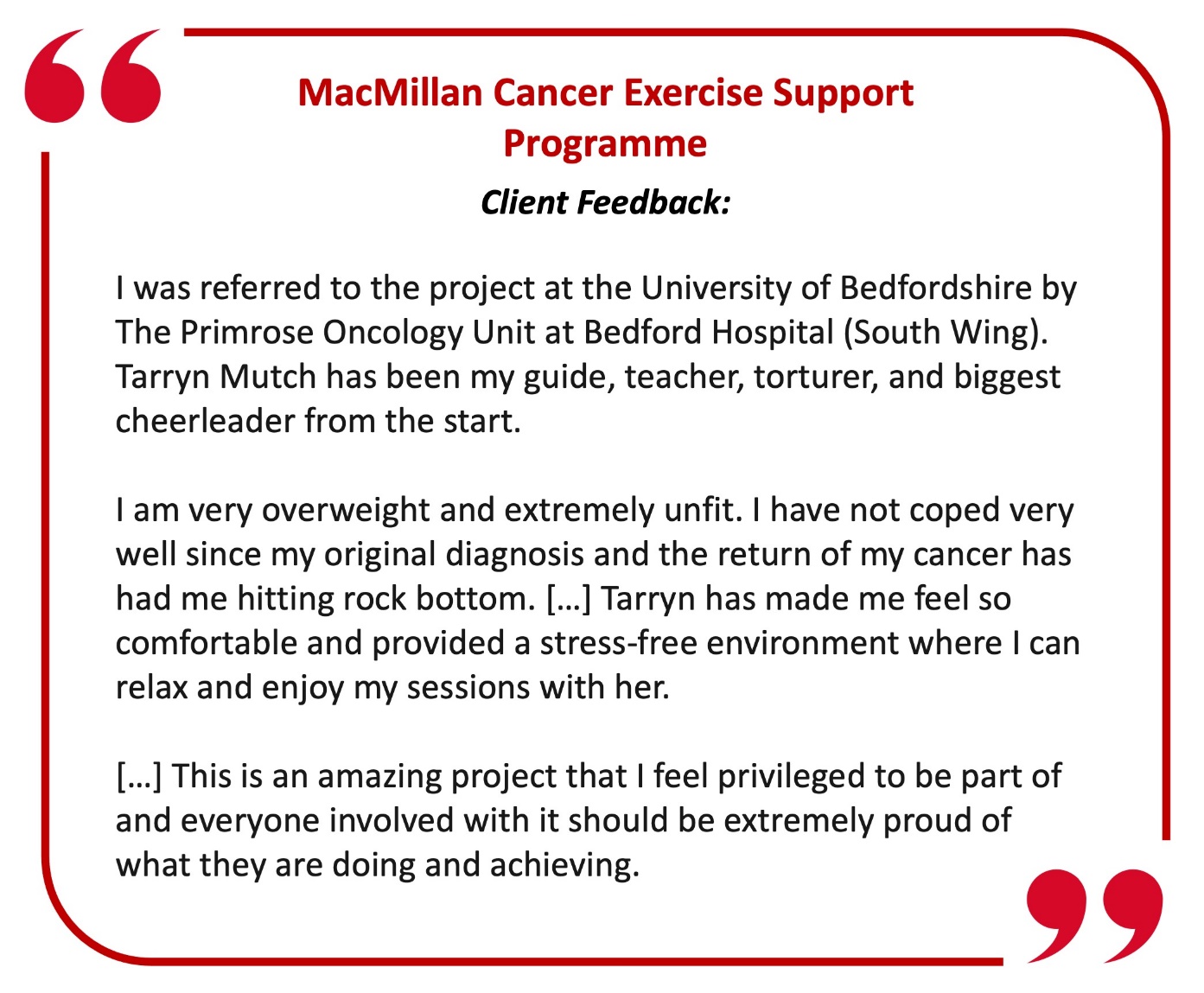
Figure Letter of thanks from a rehabilitation patient of Tarryn Mutch
As an institution, our external sponsorship rewards success in our community and builds on our values across sport, community and business; whether we are rewarding Adult achievers, funding the Community Awards, Bedford Blues Rugby or the Love Luton Partnership.
Our award-winning RadioLab performs public service outreach, winning gold at the Community Radio Awards for programmes documenting the work of Knife Crime charity in Wellingborough, or expanding on the hidden upsides of autism. RadioLab celebrated 25 years on air by bringing in the Philharmonia Orchestra - and putting on a public show of our own.
Naturally, our University connects closely to schools; leveraging our transformative power to raise the aspirations of local 6th Formers, and supporting groups, such as a reading volunteer charity to build new e-learning courses at the primary end of education.
Arts and Culture TeamThe team work closely with Luton Borough Council and key businesses / third sector via the development and delivery of the Luton Cultural Strategy: Harnessing Momentum and the Luton Heritage Strategy: Curating Luton.
The team work across communities and industry to support participation in the cultural sector and provide opportunities for local cultural organisations and budding industry practitioners to thrive. Our wide-ranging arts incubation and entrepreneurship programme complements our Community Media Festival and Cinema for All, mentoring schools in theatre-making and finding skill-creating opportunities.
They have engaged over 9,000 participants locally and regionally in Arts, Culture and Heritage based projects, launching in 2021 a brand new £250,000 capacity building programme in partnership with the National Lottery Heritage Fund, running two projects - the Heritage Impact Accelerator and Heritage Enterprise Hub.
Aspect 4: Enhancing practice
Evaluation is University wide and supports individuals, the five strategic teams, external partners & University governance.

Figure Progression of reporting and evaluation from individual to institution
Individuals:
Our innovative, customised Customer Relationship Management (CRM) system shown in the process diagram acts as the data repository; creating a University-wide approach to monitoring and evaluating our P&CE.
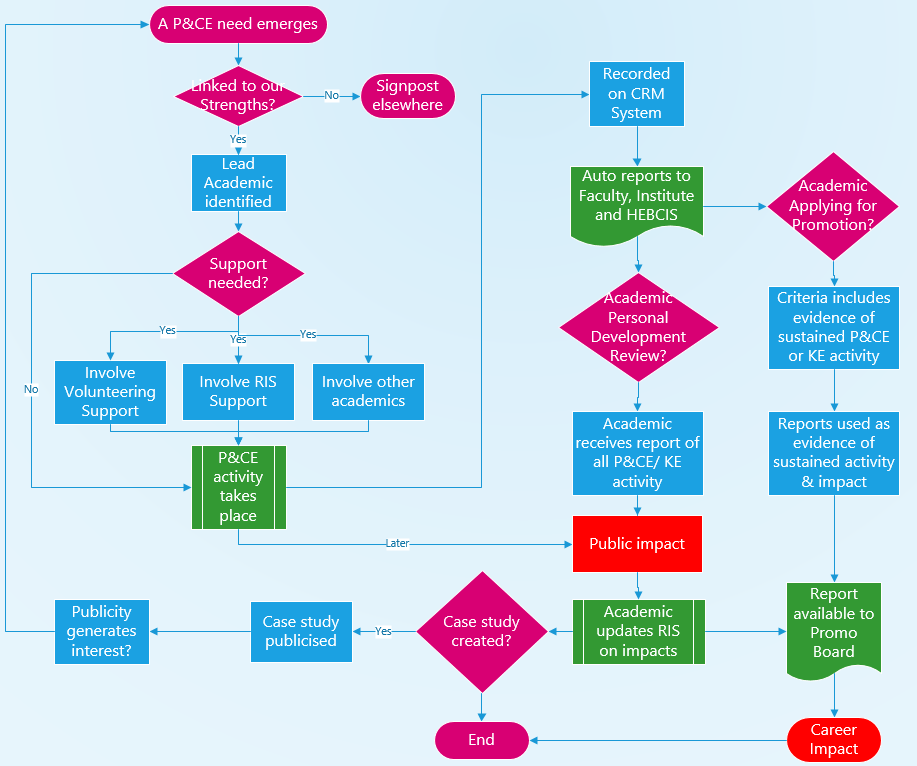
Figure Process map showing automation of reporting, monitoring and updating with impact on academic career trajectory
We record all our engagements on the CRM system via the public-facing website, running Record of Scholarly Achievement reports feeding into bi-annual staff appraisals and reminding staff to revisit and record impact. We link P&CE work to individual staff profiles to enable career progression, reward and recognition in line with the KE Concordat.
Teams:
ICS Research & Innovation Hub
Independent evaluation of our work led to local partners awarding the team the leadership of the BLMK ICS Research & Innovation Hub to tackle health and social care inequalities, so our P&CE work self-evidently leads to direct benefits for our research. The hub’s work aligns directly to the Civic Agreement Knowledge & Innovation Hub.
Sustainability Team
External auditors measure our facility impacts. Our Target Zero work involves influencing and engaging our communities; we offer 12 courses, a Green hub, environmental champions and free public events; students can also gain extra-curricular credits through Action for Sustainability, so it’s no surprise we also hold Platinum-level EcoCampus certification.
Business & Skills Team
Steering Groups and operational groups are distinct, and monitoring of all projects involves external evaluation, based on (1) Initial logic model (2) Summative Assessment Plan (3) Treasury Green Book methodology (4) ERDF guidelines - providing a robust framework to cover all evaluations.
We commissioned an institution wide evaluation in 2019/20 and have assessed £24m of business support projects such as Innovation Bridge, Time2Grow, Manufacturing and Aerospace and the Green Economy, ALPHAS and ICT Escalator.
Outreach & Employability Team
Evaluation of public attendance at events utilises Higher Education Access Tracker (HEAT) to support local and national evidence of the impact of access work. This includes personal characteristics and history of formal participation in HE. The team also gathers aggregate hours of delivery, including 1-2-1s via a project activity tracker. For disadvantaged tracked students who engaged with our programmes, the HE progression rate was 42.7% compared to a national average of 29.5%.
We offer free library membership to 6th form pupils to demonstrate what a 21st century library looks like and support pupils with study spaces, and we give specific support for local schools to enhance the Extended Project Qualification.
Arts & Culture Team
Each project has its own robust multi-layered evaluative framework, developed and agreed with partners/ funders. Surveys, questionnaires, interviews, discussion groups, participant observation, peer and self-evaluation are utilised at key stages within projects.
We frame all projects into distinct work packages, with the first and last of each project being standardised to envelop the project deliverables. This enables management, monitoring and evaluation of impact, and then all projects also tender an independent external evaluator.
Reflection:
Team reporting feeds into the joint Civic Agreement Programme Board, and thus into the governance structures of both the University and Luton Borough Council . The programme board also organises a public Annual assessment and reporting event to reflect on progress and hear feedback direct from the communities we serve.
Aspect 5: Building on success
The evaluated actions and research of an individual P&CE leader can be shown to impact both the community and the University.
| 2017 | The CTOP intervention to increase the recruitment of ‘home grown’ South Asians into nursing and midwifery careers evaluated. |
|---|---|
| 2019 | Professor Named as a Nation's Lifesaver |
| 2020 | Reputation leads to appearance on Sikh Channel to deliver Covid advice |
| 2020 | Commissioned by Private Sector on PPE for Sikh surgeons |
| 2021 | Commissioned to lead health inequalities Talk, Listen, Change Community Project |
| 2021 | Investigates air pollution effects on disadvantaged communities |
| 2022 | Creates Forestry England and EcoSikhUK Partnership to tackle air pollution |
| 2022 | Works on climate action and green spaces in national campaign |
| 2022 | King meets with Sikh community and Professor |
| 2022 | Professor leads as ICS Research & Innovation Hub launched |
Every team collects quantitative evaluation data. For instance, on one project our Arts & Culture Team have delivered 32 local workshops across 2 cohorts, with a further 225 hours of 1-2-1 mentoring time. They have supported 11 participants to apply for various competitive funding callouts, with £183,030 currently successfully awarded thus far. They’ve also built 80 key relationships between the participants and regionally/nationally significant industry professionals, including the Environment Agency, V&A, Historic England, Children in Need and Friends of the Earth.
We are currently commissioning external evaluations of 2 major projects, and will repeat our institution-wide external evaluation as the new P&CE Strategy takes effect.
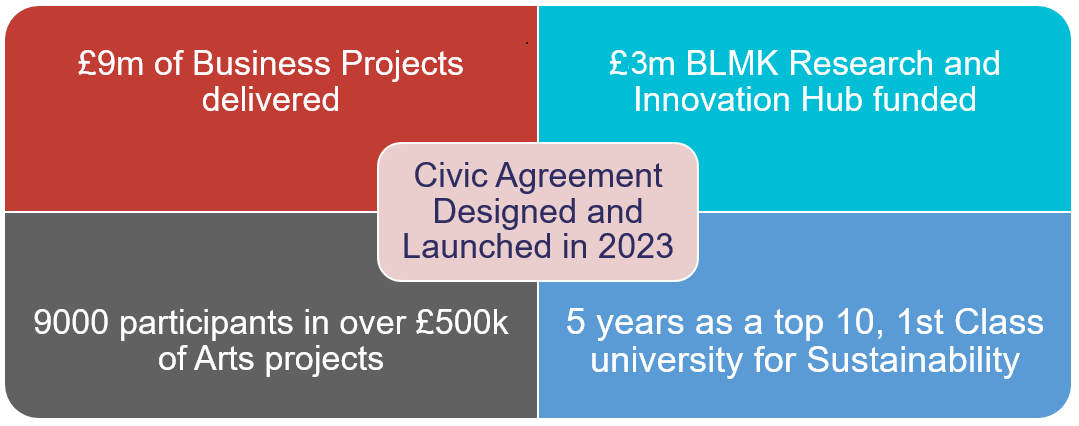
Figure Bullet Point reminders of key P&CE impacts in 2022/23
Numerical data feeds into automatic reports to the collaborative Civic Agreement Board and internal Research and Innovation Board. Beyond the numbers, qualitative data and client feedback is also stored in the CRM.
Future improvement plans include HEAT integration with our CRM and sharing of evidence/ data with our partners. This involves a strategic change of focus for our central marketing teams and will be delivered within our 2023/24 P&CE Strategy and action plan.
Note You are currently viewing the latest version of this narrative statement. View the previous version as published in previous iterations of the KEF (KEF1 and KEF2)